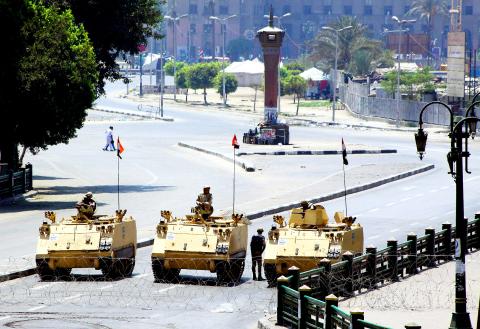Thousands of Egyptian Islamists protested across the country yesterday, sparking clashes that killed at least six people after police were authorized to use live fire.
Gunfire was heard at the sites of at least two demonstrations in the capital, witnesses said.
Security sources said five protesters loyal to ousted Egyptian president Mohamed Morsi were shot dead in clashes with security forces in the Suez Canal city of Ismailia.

Photo: EPA
Violence was also reported elsewhere, with state media saying a policeman was killed in an armed attack on a Cairo checkpoint.
Security sources said clashes had broken out between Morsi loyalists and security forces in Tanta, north of the capital.
Marches were also reported in the Mediterranean city of Alexandria, in Beni Sueif and Fayoum, south of Cairo and in the Red Sea resort town of Hurghada.
“Down with military rule,” demonstrators chanted as they waved photos of Morsi and Egyptian flags.
Earlier, the army had deployed around Cairo, where streets were deserted ahead of what Morsi supporters dubbed a “Friday of anger.”
Soldiers manned roadblocks on major thoroughfares, closing off some of them with armored personnel carriers.
The demonstrations come after 578 people were killed on Wednesday in clashes in Cairo as police cleared two Morsi protest camps and elsewhere in the country, in Egypt’s bloodiest day in decades.
The Egyptian Ministry of the Interior gave orders on Thursday for police to use live fire if government buildings come under attack.
Residents of some areas formed their own roadblocks, checking identity papers and searching cars.
The international community expressed grave concern, with the president of the UN Security Council pleading for “maximum restraint” after an emergency meeting on Wednesday’s violence.
The EU said yesterday that top officials would hold an emergency meeting on the situation in Egypt, where the army-installed government has imposed a state of emergency and nighttime curfews.
Sporadic violence continued throughout the country in the form of attacks on security personnel, with 13 killed in the Sinai Peninsula in 24 hours.
Gehad al-Haddad, a Muslim Brotherhood spokesman, announced yesterday’s marches on his Twitter account.
“Anti-coup rallies ... will depart from all mosques of Cairo and head towards Ramsis Square after [noon] prayer in ‘Friday of Anger,’” he wrote.
On Thursday, Tamarod, the protest group that organized opposition to Morsi’s rule, also urged Egyptians to take to the streets.
It said they should rally “to reject domestic terrorism and foreign interference.”
The international community expressed concern, with the EU announcing top representatives from all 28 member states would meet on Monday.
On Thursday, the UN Security Council held an emergency meeting on Egypt, calling for an end to the violence and “national reconciliation.”
US President Barack Obama said Washington was canceling a joint US-Egyptian military exercise.
However, despite scrapping the Bright Star exercise, which has been scheduled every two years since 1981, he stopped short of suspending Washington’s annual US$1.3 billion in aid.

DAREDEVIL: Honnold said it had always been a dream of his to climb Taipei 101, while a Netflix producer said the skyscraper was ‘a real icon of this country’ US climber Alex Honnold yesterday took on Taiwan’s tallest building, becoming the first person to scale Taipei 101 without a rope, harness or safety net. Hundreds of spectators gathered at the base of the 101-story skyscraper to watch Honnold, 40, embark on his daredevil feat, which was also broadcast live on Netflix. Dressed in a red T-shirt and yellow custom-made climbing shoes, Honnold swiftly moved up the southeast face of the glass and steel building. At one point, he stepped onto a platform midway up to wave down at fans and onlookers who were taking photos. People watching from inside

A Vietnamese migrant worker yesterday won NT$12 million (US$379,627) on a Lunar New Year scratch card in Kaohsiung as part of Taiwan Lottery Co’s (台灣彩券) “NT$12 Million Grand Fortune” (1200萬大吉利) game. The man was the first top-prize winner of the new game launched on Jan. 6 to mark the Lunar New Year. Three Vietnamese migrant workers visited a Taiwan Lottery shop on Xinyue Street in Kaohsiung’s Gangshan District (崗山), a store representative said. The player bought multiple tickets and, after winning nothing, held the final lottery ticket in one hand and rubbed the store’s statue of the Maitreya Buddha’s belly with the other,

‘NATO-PLUS’: ‘Our strategic partners in the Indo-Pacific are facing increasing aggression by the Chinese Communist Party,’ US Representative Rob Wittman said The US House of Representatives on Monday released its version of the Consolidated Appropriations Act, which includes US$1.15 billion to support security cooperation with Taiwan. The omnibus act, covering US$1.2 trillion of spending, allocates US$1 billion for the Taiwan Security Cooperation Initiative, as well as US$150 million for the replacement of defense articles and reimbursement of defense services provided to Taiwan. The fund allocations were based on the US National Defense Authorization Act for fiscal 2026 that was passed by the US Congress last month and authorized up to US$1 billion to the US Defense Security Cooperation Agency in support of the

HIGH-TECH DEAL: Chipmakers that expand in the US would be able to import up to 2.5 times their new capacity with no extra tariffs during an approved construction period Taiwan aims to build a “democratic” high-tech supply chain with the US and form a strategic artificial intelligence (AI) partnership under the new tariffs deal it sealed with Washington last week, Taipei’s top negotiator in the talks said yesterday. US President Donald Trump has pushed Taiwan, a major producer of semiconductors which runs a large trade surplus with the US, to invest more in the US, specifically in chips that power AI. Under the terms of the long-negotiated deal, chipmakers such as Taiwan Semiconductor Manufacturing Co (TSMC, 台積電) that expand US production would incur a lower tariff on semiconductors or related manufacturing